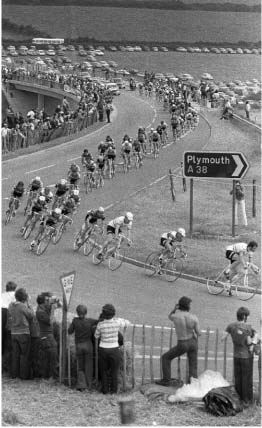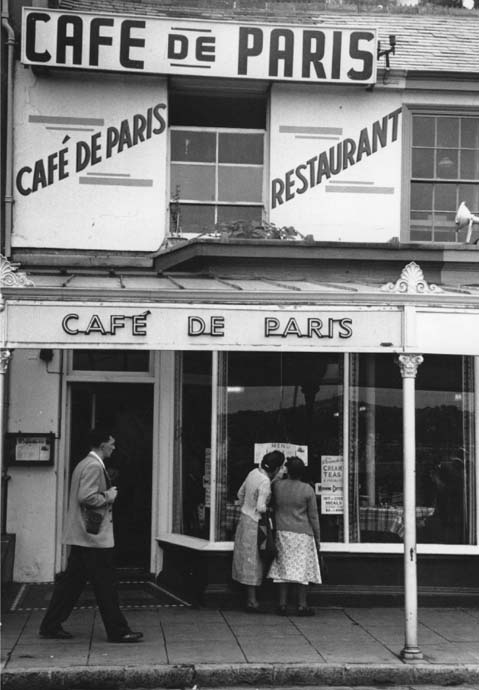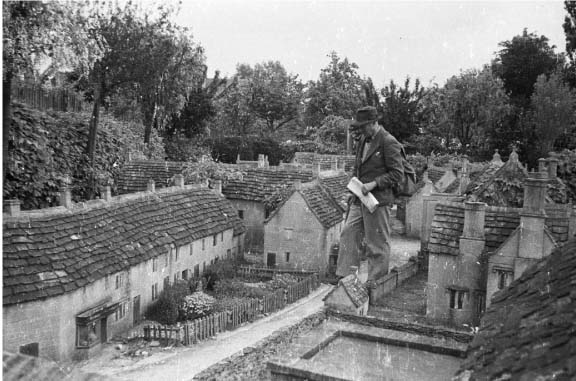Lyttelton's Britain (11 page)
Read Lyttelton's Britain Online
Authors: Iain Pattinson
Nearby is Brownsea Island, where, in 1907, Lord Baden Powell founded the Boy Scout Movement. Ever since, young lads have gained their merit badges in camping and field craft by reference to his
Scouting For Boys
, and fire-starting by reference to his
Arson For Beginners
.
Bournemouth residents are proud to show visitors the region’s ancient sedimentary beds from the Miocene era, although for extra comfort they might prefer the new orthopaedic beds from Slumberland.
Dorset’s most remarkable attraction is the Cerne Abbas Giant, a graphic representation of a naked man cut into the chalk hillside. Many people join the distinguished Cerne Abbas Society, and each May Day the society marches through the town, led by its longest standing member.

P
LYMOUTH
is a fascinating city with a fine history. Now a leading port, Plymouth is first recorded in cave drawings by local Celts when they noticed an Iron Age tribe had arrived there to mine ore and smelt in a basic fashion, but to be fair this was before the invention of bathrooms.
From this small settlement grew the major port of Wessex, the Saxon kingdom that evolved into England, and for a short time Plymouth was its capital city. But everyone soon got fed up with lousy public transport, not talking to each other and paying nearly four quid for a pint of weak lager, and decided to let London have a go instead.
Probably Plymouth’s most celebrated son is Sir Francis Drake. Sailing for the Caribbean in 1577, Drake and his men fought their way up through a hundred leagues of the Spanish Main, ending a solid season as runners-up in Division Two. When Drake returned home in triumph the following year, the delighted townsfolk swarmed out to greet him, dancing all the way from St Andrew’s Cross to the famous Plymouth Sound, an R and B derived genre not dissimilar to the later Mersey Beat but with more bass-driven riffs.
It was from Plymouth that the Pilgrim Fathers set sail in 1620. Before boarding the
Mayflower
, these devout Puritans held a service of thanksgiving at the Plymouth Hoe, followed by hymns at the Exeter Shovel and prayers for the Torquay Rotary Mower.
Their crossing was eventful and even saw the birth of a baby to Master and Mistress Hopkins. Inspired by the vast expanse of the Atlantic, they named the boy ‘Oceanus Freedom Hopkins’. By coincidence, exactly the same thing happened during a commemorative voyage in 1987, and what joy there was amongst the crew at the christening of ‘Oil Slick Condom Johnson’.
Later, Captain Cook sailed from Plymouth for Tahiti on government service in search of the Transit of Venus. Those were the days when you could rely on the authorities to recover a stolen motor vehicle.
After six months in the then little known South Pacific, Cook’s crew mutinied in protest at his constant rendition of ‘There is Nothing Like a Dame’. Cook then sailed on for seven years, braving storms and hostile natives to navigate beyond the known world, securing Australia for Britain for the purpose of guaranteeing her an unlimited supply of TV soaps and cheap but over-cheerful bar staff.

In 1974, the Tour de France visited Plymouth. It wasn’t planned but the cyclists were so drugged up they overshot going up the Cherbourg Peninsula, cleared the Channel and landed in Devon

T
ORQUAY
, the Queen of the English Riviera, owes its very existence to tourism and has much to offer the interested visitor, including Kent’s Cavern. It was in these caves that archaeologists unearthed Britain’s earliest evidence of human habitation from the Neolithic Age, including a rudimentary toilet consisting of a prehistoric hole in the ground. And that’s not the area’s only connection with France.
The modern town owes its expansion to the Napoleonic Wars, when Torbay was developed as a naval base. Admiral Lord Nelson was hospitalised in Torquay after losing an eye at the Battle of the Nile, and it was in Torquay that he famously remarked to his surgeons: ‘I’d give my right arm to have that eye back’. One can only imagine Nelson’s fury when he came round to discover that as he didn’t have a right arm, they’d removed his left one.
In 1815, Napoleon himself was brought to Torquay on his way into exile. He was billeted with his guards at a local inn for a short while, and it was after this that he sent a note that read: ‘Not to-night Josephine, I’ve just been forced to spend the night in the Duke of Wellington’.
In Victorian times, Torquay’s climate was known for its restorative properties, and the town became a Mecca for the sick and ailing, twice hosting the World Latin American Scabies Championship.

The famous Café de Paris, Torquay. The ‘fin de siècle’ art nouveau interior is based on the famous Café de Torquay, Paris
One famous convalescent visitor to Torquay was the Victorian poet and critic Elizabeth Barrett Browning, and it’s the town’s proud boast that it was in Torquay that she invented gravy.
The splendid Oldways Mansion was built at nearby Paignton by Isaac Singer, the American-born industrialist and sewing-machine magnate. His son further developed the family’s home and, as an early manufacturer of domestic freezers, became known as the world’s first fridge magnate.
Rudyard Kipling also lived at Paignton and there wrote his immortal lines: ‘If you can keep your head when all about you are losing theirs, then why not treat yourself to one of my exceedingly good cakes.’
The town was also the home in Victorian times of one Josiah Nesbitt, who tried to promote himself as a fairground attraction as England’s tallest dwarf. At five foot six and half inches, he was overshadowed by his five foot seven brother Amos, who quite remarkably claimed to be the country’s shortest giant. They found little success, until they teamed up to tour with Jolly Jim Spragg, the world’s chattiest hermit, Agnes Peach, the world’s least tattooed lady, and ‘Gunfire’ Freddie, ‘The Human Melon Ball’, who defied death nightly by sitting in a bowl of syrup.
According to the official town tourist guide, at nearby Babbacombe is found the country’s largest miniature model village. Not, one would think, a great boast.
Another popular local attraction is the Spanish Barn, which housed prisoners captured from the Armada. Many of these settled in the Torquay area and their descendants can still be seen working by night in the many local tapas bars, and by day in the town square beating a donkey to death with sticks.

Wimpey Homes’ new housing estate, Babbacombe
In the 18th Century, the local coastline became the notorious haunt of smugglers, who constantly evaded capture to the irritation of customs officers. Contraband would be unloaded and carried under cover of darkness from nearby Smugglers’ Cove, via Smugglers’ Alley, to be stored in the cellar of the Smuggler’s Inn. If only those customs men had had more to go on.
Probably Torquay’s most famous daughter was the author and playwright: Agatha Christie. Her stage drama,
The Mousetrap
, has been running continuously in the West End of London since 1952, but in those days they did tend to write much longer plays.
The Mousetrap
was actually adapted from Christie’s radio drama,
Three Blind Mice
, but the title was later changed as everyone quickly worked out that it was the farmer’s wife who did it, with a carving knife.
 LYTTELTON’S BRITAIN
LYTTELTON’S BRITAIN  ENGLAND
ENGLANDTHE HOME COUNTIES
